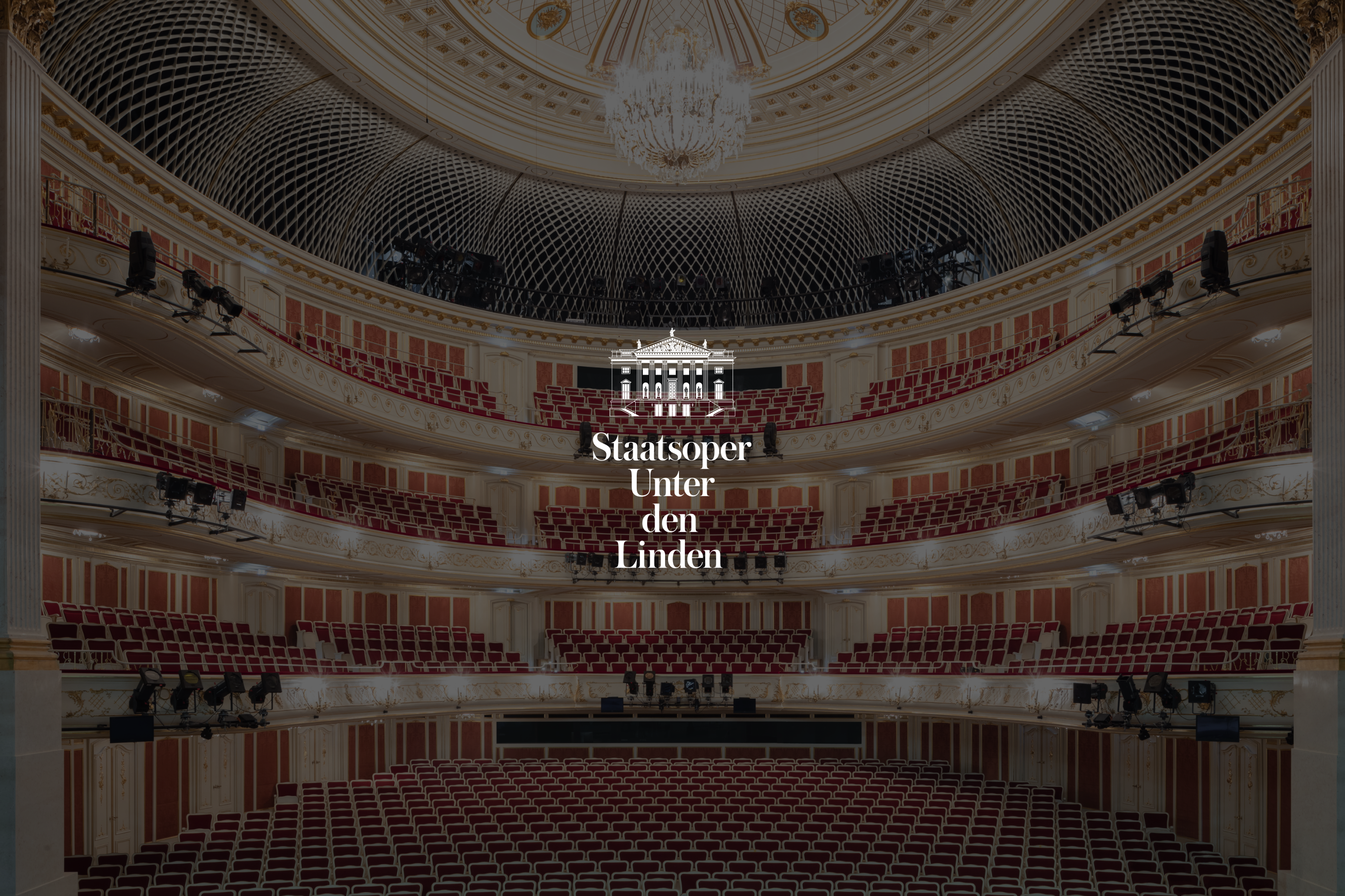Staatsoper Unter den Linden
Nabucco
Opera
Unter den Linden 7, 10117 Berlin
Giuseppe Verdi

© Bernd Uhlig

© Bernd Uhlig

© Bernd Uhlig

© Bernd Uhlig

© Bernd Uhlig

© Bernd Uhlig

© Bernd Uhlig

© Bernd Uhlig

© Bernd Uhlig

© Bernd Uhlig

© Flaka Haliti, I See a Face. Do You See a Face. #6, 2014
Description
It was his first great success, in a sense, his breakthrough: Nabucco. Premiered at Milan’s Scala in the spring of 1842, this work marks the start of the brilliant career of Giuseppe Verdi, who would become the leading Italian opera composer, going virtually unrivalled for decades. Set in biblical times in Jerusalem and Babylon, Nabucco deals with the fates of two peoples and cultures, but also the arrogance of the protagonist, who with an inflated sense of self-importance declares himself a god, only then to descend into madness. Tableaux with ceremonial gestures and poignant music, such as the famous chorus “Va pensiero” sung by the imprisoned Hebrews, are combined with scenes of intense expression, filled with drama and passion.
This will be the first production at the Staatsoper by the renowned director of opera, theater, and film Emma Dante. Bertrand de Billy, widely acknowledged as a Verdi specialist, will conduct the impressive and powerful work.
Synopsis
Part One
Jerusalem – The Babylonian king Nabucco and his troops besiege Jerusalem. The Hebrews gather at Solomon’s temple to pray for God’s help. The High Priest Zaccaria insists that they do not give up hope, since they are holding Nabucco’s daughter Fenena hostage. She once freed Ismaele, the nephew of the king of Jerusalem, in Babylon and followed him out of love back to the city. But now, Ismaele wants to help her flee. The plan is thwarted by Fenena’s sister Abigaille, who is able to get into the temple with her Babylonian soldiers thanks to a disguise. Not only Fenena, but Abigaille also loves Ismaele. She presents him with a choice: if he were ready to return her love, she would be ready to protect him and his people. But Ismaele cannot declare his love for her. By now, Nabucco has taken the city. Zaccaria wants to protect the temple from desecration and threatens the Babylonian king with Fenena’s execution. Out of love for Fenena, Ismaele disarms the High Priest and thus seals the fate of his people. Nabucco orders the destruction of the temple.
Part Two
The Impious One – Back in Babylon, Abigaille discovers a secret document that reveals her true origin. As the daughter of a slave, she is not Nabucco’s legal successor: Fenena is. The king has transferred the rule over Babylon to Fenena during his absence, and she decides to free the imprisoned Hebrews. Horrified by this, the priests of Baal decide to support Abigaille: by spreading the fictive news of Nabucco’s death, Abigaille is to seize power.
The Levites blame Ismaele for the imprisonment of the Hebrews. But Zaccaria calls on all to forgive and announces that Fenena has converted to the Jewish faith. After the news of Nabucco’s supposed death is announced, Abigaille demands the crown from Fenena. But suddenly, the supposedly dead king himself appears and demands that he should now be worshipped as the only God. The blasphemer is struck by lightning and punished with madness. Abigaille seizes the moment and takes the crown.
Part Three
The Prophecy – Deceived by Abigaille’s deception, Nabucco, who has still not regained his wits, signs the death sentence for the Hebrews. He realizes that he has just sealed the fate of his daughter Fenena. When he threatens Abigaille with revealing her true origins, she destroys the documentation of her mother’s identity before Nabucco’seyes and has the king arrested.
Full of sadness and longing, the imprisoned Hebrews recall theirhomeland. Zaccaria prophesies a better future and calls on them to summon new courage.
Part Four
The Broken Idol – When the imprisoned Nabucco learns that theexecution of the Hebrews and Fenena is being planned, he pleads to the God Jehovah and asks for forgiveness. With the assistance of his officer Abdallo, he succeeds in freeing himself.
Nabucco prevents the execution and has the idol of Baal destroyed. He grants the prisoners freedom and promises to erect a new temple for Jehovah. The dethroned Abigaille has taken poison and dies, after beseeching Fenena for forgiveness.
This will be the first production at the Staatsoper by the renowned director of opera, theater, and film Emma Dante. Bertrand de Billy, widely acknowledged as a Verdi specialist, will conduct the impressive and powerful work.
Synopsis
Part One
Jerusalem – The Babylonian king Nabucco and his troops besiege Jerusalem. The Hebrews gather at Solomon’s temple to pray for God’s help. The High Priest Zaccaria insists that they do not give up hope, since they are holding Nabucco’s daughter Fenena hostage. She once freed Ismaele, the nephew of the king of Jerusalem, in Babylon and followed him out of love back to the city. But now, Ismaele wants to help her flee. The plan is thwarted by Fenena’s sister Abigaille, who is able to get into the temple with her Babylonian soldiers thanks to a disguise. Not only Fenena, but Abigaille also loves Ismaele. She presents him with a choice: if he were ready to return her love, she would be ready to protect him and his people. But Ismaele cannot declare his love for her. By now, Nabucco has taken the city. Zaccaria wants to protect the temple from desecration and threatens the Babylonian king with Fenena’s execution. Out of love for Fenena, Ismaele disarms the High Priest and thus seals the fate of his people. Nabucco orders the destruction of the temple.
Part Two
The Impious One – Back in Babylon, Abigaille discovers a secret document that reveals her true origin. As the daughter of a slave, she is not Nabucco’s legal successor: Fenena is. The king has transferred the rule over Babylon to Fenena during his absence, and she decides to free the imprisoned Hebrews. Horrified by this, the priests of Baal decide to support Abigaille: by spreading the fictive news of Nabucco’s death, Abigaille is to seize power.
The Levites blame Ismaele for the imprisonment of the Hebrews. But Zaccaria calls on all to forgive and announces that Fenena has converted to the Jewish faith. After the news of Nabucco’s supposed death is announced, Abigaille demands the crown from Fenena. But suddenly, the supposedly dead king himself appears and demands that he should now be worshipped as the only God. The blasphemer is struck by lightning and punished with madness. Abigaille seizes the moment and takes the crown.
Part Three
The Prophecy – Deceived by Abigaille’s deception, Nabucco, who has still not regained his wits, signs the death sentence for the Hebrews. He realizes that he has just sealed the fate of his daughter Fenena. When he threatens Abigaille with revealing her true origins, she destroys the documentation of her mother’s identity before Nabucco’seyes and has the king arrested.
Full of sadness and longing, the imprisoned Hebrews recall theirhomeland. Zaccaria prophesies a better future and calls on them to summon new courage.
Part Four
The Broken Idol – When the imprisoned Nabucco learns that theexecution of the Hebrews and Fenena is being planned, he pleads to the God Jehovah and asks for forgiveness. With the assistance of his officer Abdallo, he succeeds in freeing himself.
Nabucco prevents the execution and has the idol of Baal destroyed. He grants the prisoners freedom and promises to erect a new temple for Jehovah. The dethroned Abigaille has taken poison and dies, after beseeching Fenena for forgiveness.
Cast
Temistocle Solera
Author
Bertrand de Billy
Musical Director
Emma Dante
Director
Carmine Maringola
Set Design
Vanessa Sannino
Costumes
Cristian Zucaro
Light
Manuela Lo Sicco
Choreography
Dani Juris
Chorus Master
Detlef Giese
Dramaturgy
Rebecca Graitl
Dramaturgy
Luca Salsi
Nabucco
Ivan Magrì
Ismaele
Anna Netrebko
Abigaille
Anastasia Bartoli
Abigaille
Marina Prudenskaya
Fenena
Mika Kares
Zaccaria
Sonja Herranen
Anna
Andrés Moreno García
Abdallo
Manuel Winckhler
Hohepriester des Baal
Staatsopernchor
Staatskapelle Berlin
Giuseppe Verdi
Composer
Dates
Staatsoper Unter den Linden
Unter den Linden 7, 10117 Berlin
To enable Google Maps please accept functional cookies.

Your new app
ClassicCard
Get the free app directly on your mobile:
- Browse and book all concerts, operas and ballet events in Berlin
- Save up to 90% thanks to our permanently low prices
- Network with the community and share your experience




